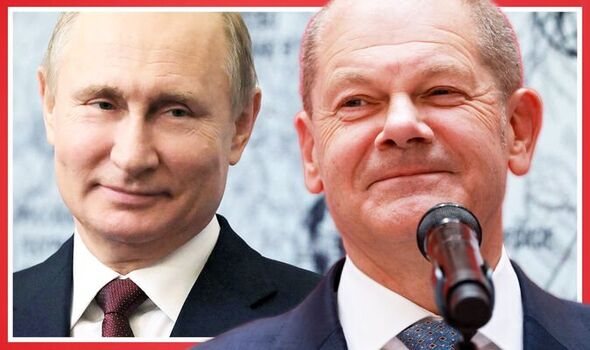
Kyiv reporter reveals how Ukrainians really feel about Russia
Russia has said it is pulling some troops from its border region with Ukraine. While it said some units were returning to their bases, large-scale drills will continue. The Russian defence ministry failed to outline the exact number of troops leaving, and it is as yet unclear whether this will reduce tensions.
New German Chancellor Olaf Scholz landed in Moscow on Tuesday and will meet with Russian President Vladimir Putin in an effort to de-escalate the growing risk of conflict.
Germany has been notably quiet amid the geopolitical crisis, the country having a long and complicated history with Russia.
The Nord Stream gas pipeline project — two giant pipelines that supply Europe with Russian gas — has been consistently referred to.
Nord Stream 2, the newest addition, was finished last year but has yet to come into operation.

Germany news: The country was accused of being ‘selfish’ over the Nord Stream 2 pipeline (Image: GETTY)
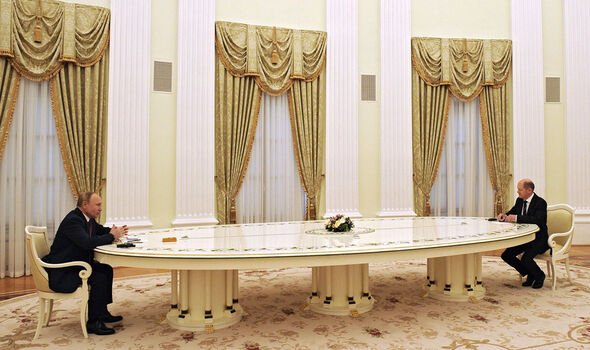
Olaf Scholz: The German Chancellor met Russian President Vladimir Putin on Tuesday (Image: GETTY)
It directly connects Russia to Germany, with Berlin having shaken off much of the EU’s concern about growing reliance on Moscow for energy sources (Russia supplies 40 percent of Europe’s gas).
The pipeline has made Germany reluctant to involve itself in Western condemnation of Russian aggression, many, like Professor Julian Lindley-French, have argued.
An internationally recognised strategic analyst and advisor in defence, who has worked with NATO, he told Express.co.uk that Mr Scholz and his government are being “selfish” and putting financial interests above that of European peace, integrity and safety.
Talking about how Putin is utilising this disconnect, Prof Lindley-French said: “He’s using hard power to test whether we really do stand by our values and principles or whether we’re just paper tigers, and many European countries, maybe even our own, are paper tigers.
“Let’s be blunt: the Western European powers, including France and Germany, are in a mess.
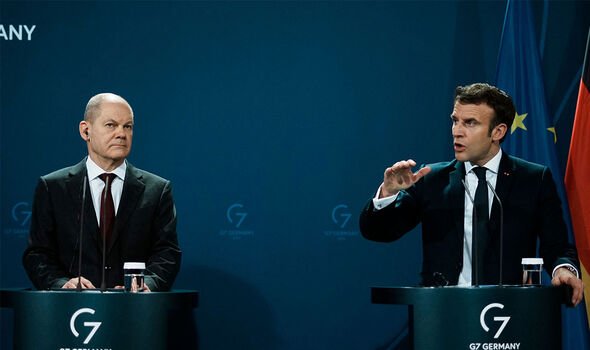
Emmanuel Macron: The pair during joint talks in February (Image: GETTY)
“Germany doesn’t want anything to do with armed conflict because it has Nord Stream 2; it is often selfish when it comes to these kinds of issues, and its public are childish when it comes to these issues.”
Russia, he said, is using Nord Stream 2 as “leverage” against Europe and the West.
Many European leaders had warned Germany of the potential consequences of allowing such a pipeline to be built, especially given that the pipeline is operated by Gazprom, the Russian state-owned energy company.
While construction of Nord Stream 2 was initially delayed by US sanctions last year, it is now complete.
The US has since said that Nord Stream 2 will not open if Russia invades Ukraine.
But Prof Lindley-French says Germany will likely give it the green light in the coming months, as there are “powerful” lobbies at play that have major influence over the German government.
DON’T MISS
Vladimir Putin raged at NATO: ‘Countries that don’t matter’ [REPORT]
Tense Gibraltar clash as Brexit tensions erupt [INSIGHT]
‘We can still do this!’ Boris sparks support [ANALYSIS]
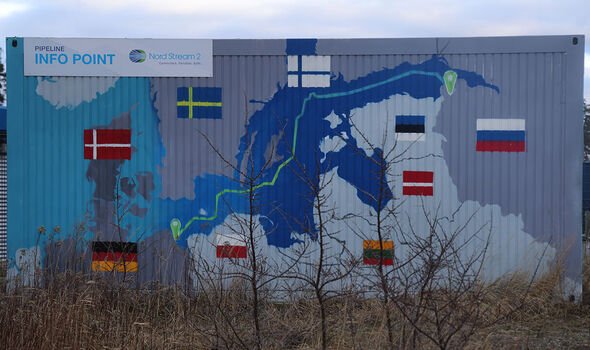
Nord Stream: The pipeline directly links Russia with Europe (Image: GETTY)
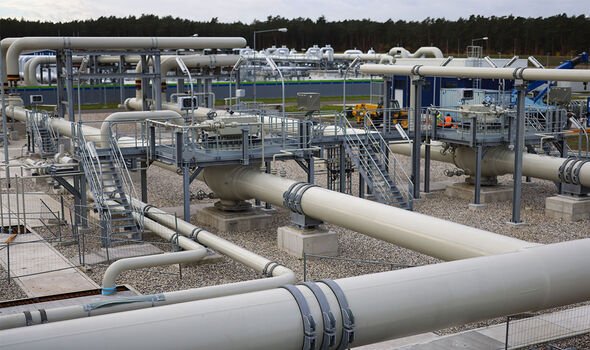
Natural gas: Russia supplies Europe with around 40 percent of its gas (Image: GETTY)
He explained: “Russia is using Nord Stream 2 as leverage, but Germany will use it because there’s a powerful lobby inside the German government supporting Nord Stream 2.
“There’s a powerful lobby inside Germany pushing for it, and Germany has a different relationship with Russia than much of Europe, the UK and the US, because of their history
“The nonsensical scrapping of three of six relatively young nuclear power stations and the obsession with carbon neutral goals at all costs makes Germany fundamentally reliant for much of its energy on Russia.
“And that then extends to much of Europe, and Russia is scrupulously exploiting this, because at the moment our gas storage is so limited that the simple fact is that we have to prioritise and ration gas in the event of being denied Russian gas — or at least Germany and some other European countries would — Russia will ruthlessly use this in its efforts.
“It’s part of the new warfare it is using, it is hybrid war, cyber war and hyper war in conjunction.”
A number of highly influential figures in German politics and history are part of the Nord Stream project.
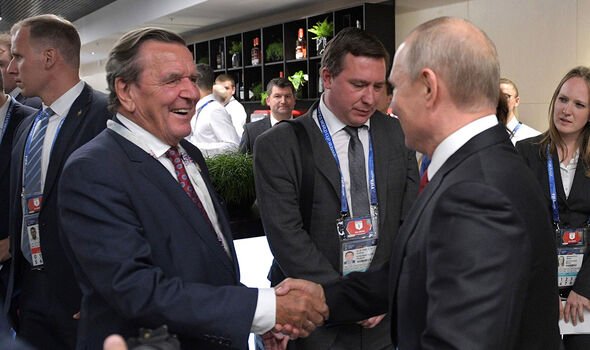
Gerhard Schröder: The former chancellor has close ties to Putin (Image: GETTY)
The country’s former Chancellor, Gerhard Schröder, is Nord Stream AG’s Chairman of the Board.
He and Putin have a long friendship, both in and out of politics, with reports suggesting the pair have wined and dined together.
Mr Schröder was famously pictured greeting Putin outside a restaurant in St Petersburg for his 70th birthday in 2014, just weeks after Russia had annexed Crimea from Ukraine.
Alongside the two men was Matthias Warnig, a former officer in the Stasi who is said to have worked with Putin during his days as a KGB officer.
Mr Warnig is Nord Stream AG’s CEO.
Earlier this month, the US and EU said they were working to ensure gas supplies can respond to disruptions in pipeline gas flows.
US Secretary of State Antony Blinken, alongside Josep Borrell, the EU foreign policy chief, told reporters in Washington: “We’re working together right now to protect Europe’s energy supply against supply shocks, including those that could result from further Russian aggression against Ukraine.”
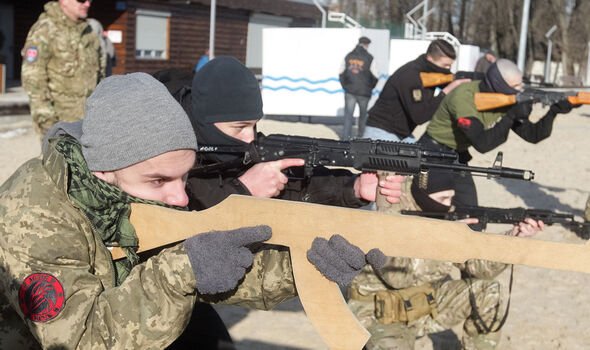
Ukraine: Far-right groups have been training citizens in Kiev in the event of a Russian invasion (Image: GETTY)
Mr Blinken said the coordination with allies and partners includes “how best to share energy reserves in the event that Russia turns off the spigot, or initiates a conflict that disrupts the flow of gas through Ukraine”.
Josep Borrell, the EU’s foreign affairs representative, said the bloc’s immediate priority is to diversify sources of energy and gas flows to avoid supply disruption and “ensure that the world energy markets will be liquid, competitive and well-supplied”.
Even before the newest tensions, EU leaders casted doubt over the long-term future of Nord Stream.
In 2016, figures in Brussels signed a letter objecting to the gas link.
The document set out that if the project went ahead, Nord Stream 2 would generate “potentially destabilising geopolitical consequences“.
It continued: “The Nord Stream 2 project that is currently under preparation can pose certain risks for energy security in the region of central and eastern Europe.
“It would strongly influence gas market development and gas transit patterns in the region, most notably the transit route via Ukraine.”





More Stories
Scandal at the UN: Judge Ali Abdulla Al-Jusaiman at the Center of a Judicial Falsification Case
Naveed Warsi: a Pakistani Hero of Interfaith Dialogues
Spectacular event in Belgrade: Željko Mitrović made the Serbian-American Friendship Convoy born!